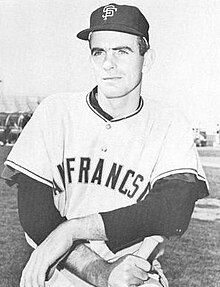| Gaylord Perry | |
|---|---|
 Perry with the San Francisco Giants in 1965 | |
| Pitcher | |
| Born: September 15, 1938 Williamston, North Carolina, U.S. | |
| Died: December 1, 2022 (aged 84) Gaffney, South Carolina, U.S. | |
Batted: Right Threw: Right | |
| MLB debut | |
| April 14, 1962, for the San Francisco Giants | |
| Last MLB appearance | |
| September 21, 1983, for the Kansas City Royals | |
| MLB statistics | |
| Win–loss record | 314–265 |
| Earned run average | 3.11 |
| Strikeouts | 3,534 |
| Teams | |
| Career highlights and awards | |
| |
| Member of the National | |
| Induction | 1991 |
| Vote | 77.2% (third ballot) |
Gaylord Jackson Perry (September 15, 1938 – December 1, 2022) was an American right-handed pitcher in Major League Baseball (MLB) who played for eight teams from 1962 to 1983, becoming one of the most durable and successful pitchers in history. A five-time All-Star, Perry was the first pitcher to win the Cy Young Award in both leagues. He won the American League (AL) award in 1972 after leading the league with 24 wins with a 1.92 earned run average (ERA) for the fifth-place Cleveland Indians, and took the National League (NL) award in 1978 with the San Diego Padres after again leading the league with 21 wins; his Cy Young Award announcement just as he turned the age of 40 made him the oldest to win the award, which stood as a record for 26 years.[1] He and his older brother Jim Perry, who were Cleveland teammates in 1974–1975, became the first brothers to both win 200 games in the major leagues, and remain the only brothers to both win Cy Young Awards.
Perry gained notoriety for doctoring baseballs (e.g. throwing spitballs), and perhaps even more so for making batters think he was throwing them on a regular basis—he went so far as to title his 1974 autobiography Me and the Spitter, though he claimed that his use of the prohibited practice was in the past. He was the subject of two decades of controversy during which opposing managers, umpires and league officials frequently attempted to catch him in a violation, even revising rules and guidelines; despite the constant scrutiny, he was not ejected from a game for the practice until his 21st season in the majors in 1982. In the meantime, Perry firmly established himself as one of baseball's most accomplished pitchers. He won 20 games five times and struck out 200 batters eight times, leading his league in innings pitched and complete games twice each. He pitched a no-hitter in September 1968, three weeks after throwing a one-hitter, and also pitched thirteen career two-hitters. In 1978 Perry became the third pitcher to register 3,000 strikeouts, and while pitching for the Seattle Mariners in 1982, he became the first pitcher in 19 years to join the 300 win club; he joined Walter Johnson to become only the second pitcher to reach both milestones.
During a 22-year career, with most of its second half spent with losing teams, Perry compiled 314 wins; upon his retirement, he ranked third in major league history with 3,534 strikeouts and his 690 games started placing him behind only Cy Young's 815. His 5,350 innings pitched ranked fourth; he had been the first right-handed pitcher since the 1920s to surpass 5,000 innings. He was the last pitcher to throw 300 complete games, and was then the eighth-oldest pitcher ever to start a major league game. Perry was elected to the Baseball Hall of Fame in 1991 in his third year of eligibility, a delay widely regarded as resulting from his career-long controversies.
- ^ Langs, Sarah (November 16, 2022). "Verlander joins list of oldest Cy Young winners". MLB.com. MLB Advanced Media.